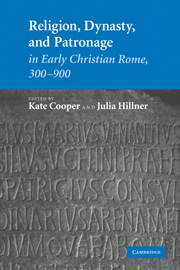Book contents
- Frontmatter
- Contents
- Acknowledgements
- List of contributors
- Abbreviations
- Introduction
- PART I ICONS OF AUTHORITY: POPE AND EMPEROR
- PART II LAY, CLERICAL, AND ASCETIC CONTEXTS FOR THE ROMAN GESTA MARTYRUM
- PART III RELIGION, DYNASTY, AND PATRONAGE
- 6 Poverty, obligation, and inheritance: Roman heiresses and the varieties of senatorial Christianity in fifth-century Rome
- 7 Demetrias ancilla dei: Anicia Demetrias and the problem of the missing patron
- 8 Families, patronage, and the titular churches of Rome, c. 300–c. 600
- 9 To be the neighbour of St Stephen: patronage, martyr cult, and Roman monasteries, c. 600–c. 900
- Bibliography
- Index
6 - Poverty, obligation, and inheritance: Roman heiresses and the varieties of senatorial Christianity in fifth-century Rome
Published online by Cambridge University Press: 02 October 2009
- Frontmatter
- Contents
- Acknowledgements
- List of contributors
- Abbreviations
- Introduction
- PART I ICONS OF AUTHORITY: POPE AND EMPEROR
- PART II LAY, CLERICAL, AND ASCETIC CONTEXTS FOR THE ROMAN GESTA MARTYRUM
- PART III RELIGION, DYNASTY, AND PATRONAGE
- 6 Poverty, obligation, and inheritance: Roman heiresses and the varieties of senatorial Christianity in fifth-century Rome
- 7 Demetrias ancilla dei: Anicia Demetrias and the problem of the missing patron
- 8 Families, patronage, and the titular churches of Rome, c. 300–c. 600
- 9 To be the neighbour of St Stephen: patronage, martyr cult, and Roman monasteries, c. 600–c. 900
- Bibliography
- Index
Summary
In 410, Augustine of Hippo had a difficult letter to write to Caeonia Albina, daughter of the Roman praefectus urbi Caeonius Rufinus Albinus (praefectus urbi from 389 to 391), widow of the senator Valerius Publicola, and mother of the future saint Melania the Younger. Melania had visited Hippo with her husband, Pinian, as part of a tour of visitation to the couple's estates in Italy and Africa. In a pious spree characterized more by enthusiasm than good sense, the pair, both in their mid-twenties, were selling off as many of their extensive land-holdings as the market would bear, and undertaking a one-off bonanza of pious gift-giving to the religious individuals and institutions along their way. Things had evidently gone badly wrong in Augustine's own town of Hippo. Albina had addressed a sharp letter to Augustine, and although her reprimand is now lost, Augustine's letter of reply stands as a record of the tensions and uncertainties in the fifth-century churches regarding the role of aristocratic patrons. In this heady period of experimentation, the ‘ground rules’ for the direction of aristocratic wealth to pious causes had yet to be established. It is with the fifth-century attempt to develop these ground rules, especially with regard to that most self-possessed group of donors, the senatorial aristocracy, that the present chapter will concern itself.
- Type
- Chapter
- Information
- Publisher: Cambridge University PressPrint publication year: 2007
- 4
- Cited by



